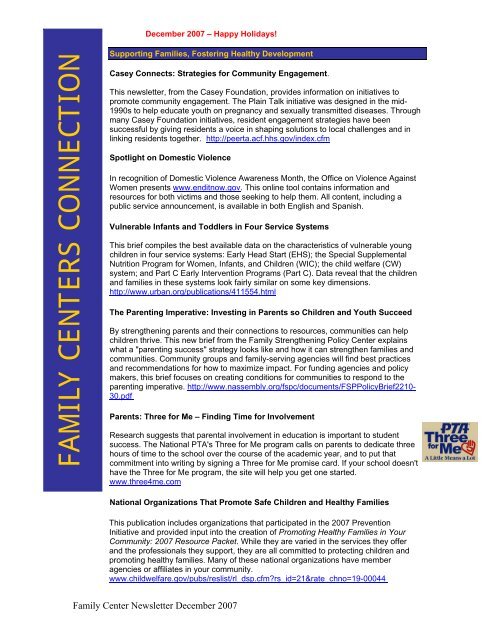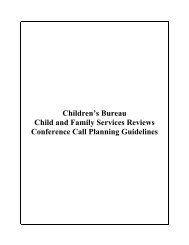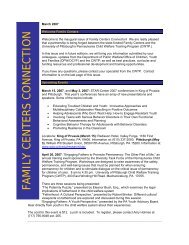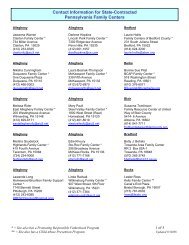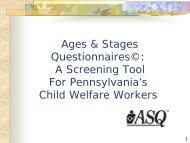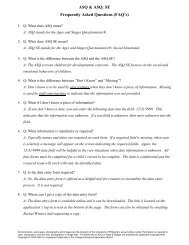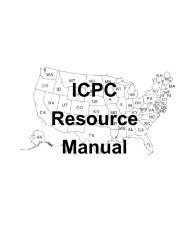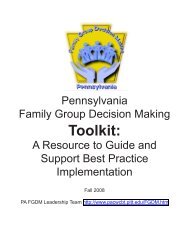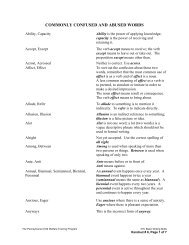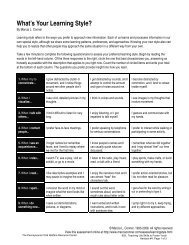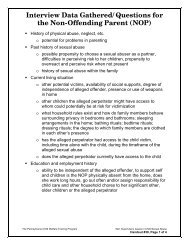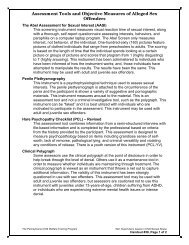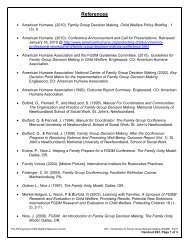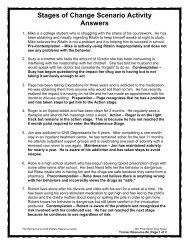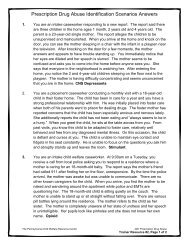December 2007 Family Center Newsletter - Pennsylvania Child ...
December 2007 Family Center Newsletter - Pennsylvania Child ...
December 2007 Family Center Newsletter - Pennsylvania Child ...
You also want an ePaper? Increase the reach of your titles
YUMPU automatically turns print PDFs into web optimized ePapers that Google loves.
<strong>December</strong> <strong>2007</strong> – Happy Holidays!<br />
FAMILY CENTERS CONNECTION<br />
Supporting Families, Fostering Healthy Development<br />
Casey Connects: Strategies for Community Engagement.<br />
This newsletter, from the Casey Foundation, provides information on initiatives to<br />
promote community engagement. The Plain Talk initiative was designed in the mid-<br />
1990s to help educate youth on pregnancy and sexually transmitted diseases. Through<br />
many Casey Foundation initiatives, resident engagement strategies have been<br />
successful by giving residents a voice in shaping solutions to local challenges and in<br />
linking residents together. http://peerta.acf.hhs.gov/index.cfm<br />
Spotlight on Domestic Violence<br />
In recognition of Domestic Violence Awareness Month, the Office on Violence Against<br />
Women presents www.enditnow.gov. This online tool contains information and<br />
resources for both victims and those seeking to help them. All content, including a<br />
public service announcement, is available in both English and Spanish.<br />
Vulnerable Infants and Toddlers in Four Service Systems<br />
This brief compiles the best available data on the characteristics of vulnerable young<br />
children in four service systems: Early Head Start (EHS); the Special Supplemental<br />
Nutrition Program for Women, Infants, and <strong>Child</strong>ren (WIC); the child welfare (CW)<br />
system; and Part C Early Intervention Programs (Part C). Data reveal that the children<br />
and families in these systems look fairly similar on some key dimensions.<br />
http://www.urban.org/publications/411554.html<br />
The Parenting Imperative: Investing in Parents so <strong>Child</strong>ren and Youth Succeed<br />
By strengthening parents and their connections to resources, communities can help<br />
children thrive. This new brief from the <strong>Family</strong> Strengthening Policy <strong>Center</strong> explains<br />
what a "parenting success" strategy looks like and how it can strengthen families and<br />
communities. Community groups and family-serving agencies will find best practices<br />
and recommendations for how to maximize impact. For funding agencies and policy<br />
makers, this brief focuses on creating conditions for communities to respond to the<br />
parenting imperative. http://www.nassembly.org/fspc/documents/FSPPolicyBrief2210-<br />
30.pdf<br />
Parents: Three for Me – Finding Time for Involvement<br />
Research suggests that parental involvement in education is important to student<br />
success. The National PTA's Three for Me program calls on parents to dedicate three<br />
hours of time to the school over the course of the academic year, and to put that<br />
commitment into writing by signing a Three for Me promise card. If your school doesn't<br />
have the Three for Me program, the site will help you get one started.<br />
www.three4me.com<br />
National Organizations That Promote Safe <strong>Child</strong>ren and Healthy Families<br />
This publication includes organizations that participated in the <strong>2007</strong> Prevention<br />
Initiative and provided input into the creation of Promoting Healthy Families in Your<br />
Community: <strong>2007</strong> Resource Packet. While they are varied in the services they offer<br />
and the professionals they support, they are all committed to protecting children and<br />
promoting healthy families. Many of these national organizations have member<br />
agencies or affiliates in your community.<br />
www.childwelfare.gov/pubs/reslist/rl_dsp.cfm?rs_id=21&rate_chno=19-00044<br />
<strong>Family</strong> <strong>Center</strong> <strong>Newsletter</strong> <strong>December</strong> <strong>2007</strong>
Supporting Healthy Relationships between Young <strong>Child</strong>ren and Parents: Lessons from<br />
Attachment Theory and Research<br />
According to attachment theory and research, early child-parent relationships lay the foundation<br />
for children's later social, emotional and school functioning. This new brief from the <strong>Center</strong> for<br />
<strong>Child</strong> and <strong>Family</strong> at Duke University examines the range of attachments and their importance for<br />
later development and offers guidelines and curricula recommendations for practitioners,<br />
policymakers, parents and others.<br />
www.pubpol.duke.edu/cneters/child/ecal/attachment/index.htm<br />
What Works: Evidence on Early <strong>Child</strong> Interventions<br />
The U.S. Department of Education's What Works Clearinghouse recently reviewed<br />
17 early childhood interventions (curricula and practices) aimed at children ages 3 to<br />
5 in center-based child care. Each review covered: oral language, print knowledge,<br />
phonological processing, early reading/writing, cognition and math. It identifies the programs<br />
offered evidence of strong positive effects. www.ies.gov/ncee/wwc/reports/ear ly_ed/<br />
Trends<br />
Rural America at a Glance<br />
From the US Department of Agriculture, this report shows trends in rural America over the last<br />
year. Between July 2005 and July 2006, the population of the nonmetropolitan United States<br />
grew 0.6 percent. Additionally, nonmetropolitan employment increased by 1.4 percent from 2005<br />
to 2006, which was similar to 2004 to 2005 data. This resource provides the most recent<br />
indicators of social and economic conditions in rural areas, for use in developing policies and<br />
programs to assist rural people and their communities. http://peerta.acf.hhs.gov/index.cfm<br />
New Campaign: America Forward<br />
<strong>December</strong> 11 marked the official launch of America Forward, a coalition of<br />
more than 60 organizations involved in health, education, poverty and economic mobility,<br />
workforce and other issues. Its aim is "to introduce the presidential campaigns to the work of<br />
social entrepreneurs and encourage them to ... support policies that encourage new approaches<br />
to difficult social problems," writes the Chronicle of Philanthropy.<br />
Visit the America Forward Website: http://americaforward.org/<br />
A Science-Based Framework for Early <strong>Child</strong>hood Policy<br />
This framework for using evidence to improve outcomes in learning, behavior and health for<br />
vulnerable children is from the National Forum on Early <strong>Child</strong>hood Program Evaluation and the<br />
National Scientific Council on the Developing <strong>Child</strong>. It draws on neuroscience, behavioral and<br />
developmental science, economics, and decades of early childhood research to guide better<br />
policies and practice. http://www.developingchild.net/pubs/persp/pdf/Policy_Framework.pdf<br />
LINKS (Lifecourse Interventions to Nurture Kids Successfully)<br />
This database from <strong>Child</strong> Trends now features descriptions of over 200 evaluated programs that<br />
enhance children's development. Each program description includes a brief summary of the type<br />
of program, its target population, its intended outcomes, and what experimental evaluations have<br />
found the program's impacts to be.<br />
http://www.childtrends.org/_catdisp_page.cfm?LID=C69A59D5-7C1A-47C1-<br />
AB7C751AD5A71718<br />
that<br />
<strong>Family</strong> <strong>Center</strong> <strong>Newsletter</strong> <strong>December</strong> <strong>2007</strong>
Funding Opportunities and Sustainability<br />
Grant: GE Healthcare –<br />
For programs that focus on youth education and/or promote healthy lives.<br />
Funder: General Electric.<br />
Eligibility: Nonprofits. Deadline: Feb. 1, May 1, Aug. 1, Nov. 1.<br />
Amount: $1,000 to $50,000.<br />
www.gehealthcare.com/usen/about/gehealthcare_americas_charitable_giving_guidelines.pdf<br />
Grant: Relatives as Parents Program –<br />
To promote the creation or expansion of services for grandparents and other relatives who are<br />
surrogate parents to children of absentee caregivers.<br />
Funder: The Brookdale Foundation. Eligibility: Local and state agencies.<br />
Deadline: Local agencies, Jan. 10; state agencies, Feb. 8.<br />
Amount: $10,000 over two years.<br />
Contact: www.brookdalefoundation.org/relativesasparents.htm<br />
Grant: Champions for Healthy Kids –<br />
For community projects that develop creative ways to help youth adopt balanced diets and<br />
physically active lifestyles. Funder: The General Mills Foundation, American Dietetic Association<br />
Foundation and the President’s Council on Physical Fitness.<br />
Eligibility: Nonprofits. Deadline: Jan. 15. Amount: 50 grants of $10,000 each.<br />
Contact: www.generalmills.com/corporate/commitment/champions.aspx<br />
Youth Programs Resource <strong>Center</strong> and Clearinghouse<br />
To help smaller youth and family programs, the Finance Project and its partners (including the<br />
Forum for Youth Investment) have created a clearinghouse of information and resources related<br />
to supporting and sustaining youth programs, initiatives and policies. Here, you'll find data, tools,<br />
financing and funding strategies, policy guides and technical assistance.<br />
www.financeproject.org/irc/yp.asp<br />
SAMHSA – Website Supports Grant Applications<br />
Sustainability is a topic that often comes up when discussing program activities. Often agencies<br />
look outside of their government funding streams for additional funds to meet the changes needs<br />
of the population. Funders, both private and government sources, often require that evidenced<br />
based practices be used. To that end, SAMHSA provides a website that assists in the review of<br />
interventions when you are considering new programs. It is not an all inclusive list of<br />
interventions, but it is a good resource. It provides an intervention summary, including the "Key<br />
Findings" sections that summarize the research results for each outcome. The site can be<br />
viewed by clicking the link below or cutting and pasting the address in your browser.<br />
http://nrepp.samhsa.gov/index.htm<br />
Curricular Resources<br />
Walk a Mile 2008: Training Opportunity<br />
Since 1994, this program has brought together policymakers, low-income<br />
constituents and youth in foster care in 36 states for a unique one-month project.<br />
To raise awareness about the challenges facing people living in poverty and in<br />
foster care, policymakers are paired with a low-income constituent or a youth<br />
living in foster care. The program is looking for community organizations working with low-income<br />
constituents or youth in foster care to coordinate 2008 projects. There are two kinds of projects:<br />
statewide projects (state legislators are matched with constituents in their districts) or local<br />
projects. "Walk a Mile Coordinators' Training" will be held January 28 to 29, 2008 in Seattle.<br />
Cost: $350. For more information e-mail: patricia@walkamile.org.<br />
<strong>Family</strong> <strong>Center</strong> <strong>Newsletter</strong> <strong>December</strong> <strong>2007</strong>
PARENT MENTORS<br />
A program that matches former clients with parents new to the system is showing promise for<br />
increasing parent engagement and support. In Contra Costa County, CA, parents who have<br />
successfully navigated the child welfare system and reunited with their children are selected,<br />
hired, and trained as parent advocates who can work within the system to provide mentoring and<br />
support to other parents dealing with child welfare issues. This Parent Partners program is<br />
described in a recent article in <strong>Child</strong> Welfare.<br />
Trained Parent Partners are able to help parents new to the child welfare system by:<br />
• Sharing their own experiences and modeling appropriate and empowering behavior<br />
• Connecting parents with appropriate resources, often providing a personal contact<br />
• Serving as contacts at court hearings and team decision-making meetings<br />
• Serving as a link between parents and the child welfare system<br />
• Expanding the parents' social networks<br />
An extra benefit of the Parent Partners program is the impact it has made on child welfare staff<br />
and the agency's organizational climate. Having the paid Parent Partners on the staff and in<br />
nearby office cubicles has promoted more positive language about parents by caseworkers, as<br />
well as greater sensitivity to parent concerns and perspectives. This shift in attitudes may<br />
contribute to a more family-centered organization.<br />
Read about the Parent Partners program in "Closer to Home: Parent Mentors in <strong>Child</strong> Welfare,"<br />
by Edward Cohen and Linda Canan, in the September/October 2006 issue of <strong>Child</strong> Welfare. For<br />
information, visit the <strong>Child</strong> Welfare League of America website:<br />
www.cwla.org/articles/cwjabstracts.htm#0609<br />
Preparing Staff to Involve Youth and Families<br />
The National Collaboration for Youth and National Youth Development Learning Network offer<br />
free training activities (www.nydic.org/nydic/staffing/workforce) for preparing frontline youth<br />
workers in three key competency areas:<br />
• Involving and Empowering Youth<br />
• Cares for, Involves and Works with Families and Community<br />
• Advocates for the Rights of Disenfranchised Youth and Families<br />
Working with Immigrant <strong>Child</strong>ren, Youth and Families<br />
According to the last Census, one in five children in this country today is an immigrant or the child<br />
of an immigrant, and the number is rising. This guide from the National Collaboration for Youth<br />
offers the context of the immigrant youth experience and practical tips for hiring, developing and<br />
retaining staff to work with this population.<br />
www.nydic.org/nydic/staffing/workforce/PreparingStafftoWorkwithImmigrantYouth.htm<br />
Resources – Outcomes Development, Monitoring and Evaluation<br />
Screening and Assessment for <strong>Family</strong> Engagement, Retention, and Recovery<br />
The SAFERR monograph was developed in response to frequent requests from managers of<br />
child welfare agencies for a "tool" that caseworkers could use to screen parents for potential<br />
substance use disorders in order to make decisions about children's safety. Although research<br />
findings and practical experience have established that no single checklist yields the kind of<br />
information caseworkers need to make difficult decisions about whether children are safe, they<br />
have identified an array of screening instruments and practice principles that, if used<br />
appropriately, can provide timely information to guide those decisions. It also provides guidance<br />
on developing collaborative efforts to improve outcomes for families.<br />
http://ncadistore.samhsa.gov/catalog/productDetails.aspx?ProductID=17633<br />
<strong>Family</strong> <strong>Center</strong> <strong>Newsletter</strong> <strong>December</strong> <strong>2007</strong>
Friends National Resource <strong>Center</strong><br />
The FRIENDS National Resource <strong>Center</strong> is contracted by Administration on <strong>Child</strong>ren, Youth and<br />
Families, <strong>Child</strong>ren's Bureau to promote the purposes of the Community-Based <strong>Child</strong> Abuse<br />
Prevention (CBCAP) program and serve as a technical assistance agency to State agency leads.<br />
CBCAP dollars are designed to support community-based efforts to develop, operate, expand<br />
and enhance initiatives for the prevention of child abuse. In <strong>Pennsylvania</strong>, a portion of CBCAP<br />
dollars provide support for state funded <strong>Family</strong> <strong>Center</strong>s, Promoting Responsible Fatherhood and<br />
<strong>Child</strong> Abuse Prevention grant initiatives.<br />
CBCAP State lead agencies can access training & technical assistance from FRIENDS on topics<br />
including:<br />
• Evidence Based & Evidence Informed Practices<br />
• Evaluating Participant Outcomes<br />
• Peer Review<br />
• Parent Leadership<br />
• Prevention’s role in <strong>Child</strong> and <strong>Family</strong> Service Reviews<br />
• Respite services<br />
• Diverse populations<br />
• Leveraging Funding<br />
There is a wealth of valuable information available on the FRIENDS website. You can access<br />
that web site at: www.friendsnrc.org. Many evaluation-related products including guidebooks,<br />
fact sheets, and evaluation tools have been developed and can be viewed at<br />
http://www.friendsnrc.org/outcome/initiative.htm<br />
The Evaluation Toolkit & Logic Model Builder was conceptualized and developed as a team effort<br />
with staff from FRIENDS, <strong>Child</strong> Welfare Information Gateway, the <strong>Child</strong>ren’s Bureau, CBCAP<br />
grantees, parent leaders, and child abuse prevention programs. You can access these valuable<br />
resources at:<br />
Demonstration Evaluation Toolkit<br />
http://www.friendsnrc.org/outcome/toolkit/index.htm<br />
Logic Model Builder<br />
www.childwelfare.gov/preventing/developing/toolkit/ or<br />
http://www.friendsnrc.org/outcome/toolkit/builder.html<br />
OCYF Update<br />
The <strong>Family</strong> <strong>Center</strong> Applications for FY 2008-09 were distributed by email on Friday, <strong>December</strong><br />
7 th , <strong>2007</strong>. If you or your Grantee did not receive the email, please contact Holly Stockwell at 717-<br />
214-6765 or Hstockwell@state.pa.us.<br />
The <strong>Family</strong> <strong>Center</strong> grant, which previously included components for the Fatherhood Initiative and<br />
Time-Limited <strong>Family</strong> Reunification (TLFR), has become three separate grants that will function in<br />
3-year cycles, FY 2008-09 though FY 2010-11. The Fatherhood Initiative has become a<br />
“Promoting Responsible Fatherhood or <strong>Child</strong> Abuse Prevention (PRF/CAP)” grant. All current<br />
<strong>Family</strong> <strong>Center</strong>s and County <strong>Child</strong>ren and Youth Agencies (CCYA) are eligible to apply.<br />
There is a pre-proposal meeting for <strong>Family</strong> <strong>Center</strong>s planned for Monday, January 14 th . This<br />
meeting will be a pre-proposal for the <strong>Family</strong> <strong>Center</strong> application and the PRF/CAP application.<br />
The TLFR grant is now only available to County <strong>Child</strong>ren and Youth Agencies, although <strong>Family</strong><br />
<strong>Center</strong>s may function as a sub-contractor. The application for TLFR was only sent to the<br />
CCYA. <strong>Family</strong> <strong>Center</strong>s may request a copy of the TLFR application by email:<br />
Hstockwell@state.pa.us.<br />
Congratulations to Holly Kuch who was recently married; her last name is now Stockwell.<br />
<strong>Family</strong> <strong>Center</strong> <strong>Newsletter</strong> <strong>December</strong> <strong>2007</strong>
University of Pittsburgh Sponsored-Training<br />
Please remember that <strong>Family</strong> <strong>Center</strong> staff members are welcome to attend any training offered<br />
by the University’s <strong>Pennsylvania</strong> <strong>Child</strong> Welfare Training Program (CWTP.) If you have any<br />
questions about workshops and training, please contact your county’s liaison listed below.<br />
<strong>Family</strong> <strong>Center</strong>s Program Contact Information<br />
<strong>Pennsylvania</strong> <strong>Child</strong> Welfare Training Program<br />
403 East Winding Hill Road<br />
Mechanicsburg, PA 17055<br />
717.795.9048<br />
DEBORAH MOCK<br />
814.494.1325 E-mail: dpm23@pitt.edu<br />
(Bedford, Blair, Clearfield, Fulton, Somerset)<br />
JENNIFER CARUSO<br />
412.335.4263 E-mail: jcar@pitt.edu<br />
(Cameron, Clarion, Greene, Lawrence, Westmoreland, McKean)<br />
BILL DOUGHERTY<br />
717.870.6114 E-mail: wfd3@pitt.edu<br />
(Bradford, Wayne)<br />
JODY PRICE<br />
717.418.9789 E-mail: jlp78@pitt.edu<br />
(Lackawanna, Columbia, Luzerne)<br />
CHRISTINA FATZINGER<br />
Ext. 275 E-mail: cmf27@pitt.edu<br />
(Dauphin, Lancaster)<br />
CATHY GOENS<br />
717.991.8656 E-mail: cgh5@pitt.edu<br />
(Lehigh)<br />
JUSTIN LEE<br />
484.553.6343 E-mail: jml75@pitt.edu<br />
(Berks, Chester, Delaware, Montgomery)<br />
MARY ORR<br />
814.598.0467 E-mail: mco6@pitt.edu<br />
(Northampton)<br />
STEPHEN EIDSON<br />
814.598.2747 E-mail: see13@pitt.edu.<br />
(Allegheny)<br />
JERRY SOPKO<br />
412.260.6530 E-mail: gps8@pitt.edu<br />
(Erie, Mercer)<br />
WENDY UNGER<br />
Ext. 298 Email: wau2@pitt.edu<br />
(Dauphin)<br />
ANN MOLSKY, Administrative Assistant<br />
TODD LLOYD, Unit Lead<br />
DAVID DERBES, State Grant Coordinator<br />
HOLLY STOCKWELL, <strong>Family</strong> <strong>Center</strong> Specialist<br />
Ext. 231 E-mail: akm9@pitt.edu<br />
Ext. 207 E-mail: tel11@pitt.edu<br />
717.705.2911 Email: dderbes@state.pa.us<br />
717.214.6765 E-mail: hstockwell@state.pa.us<br />
<strong>Family</strong> <strong>Center</strong> <strong>Newsletter</strong> <strong>December</strong> <strong>2007</strong>


